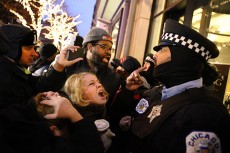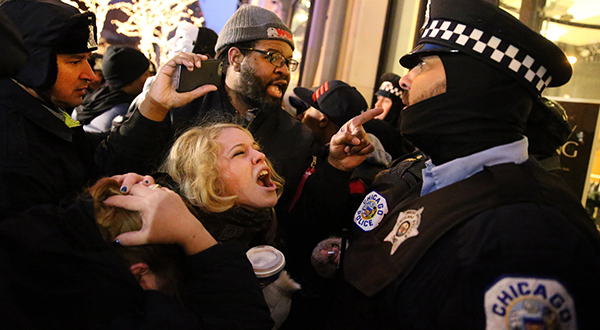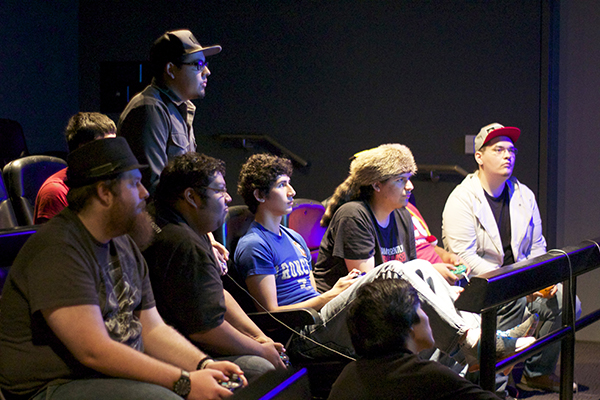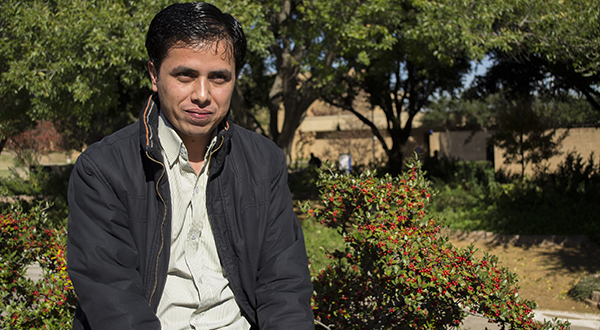By Jamil Oakford/ managing editor

Chris Sweda/Chicago Tribune/MCT
Some TCC African-American students see the police shooting that caused protests in Chicago as a reinforcement of their long-standing distrust of police departments.
“I don’t feel comfortable around the police as much as I should,” South student Mikita Reed said. “As an African-American, I don’t really feel safe around them.”
Other African-American students support Reed’s belief. The most recent video released of police brutality against African-Americans supports that narrative as well.
Thirteen months after a police officer shot black civilian Laquan McDonald, the Chicago Police Department and the city finally released the tapes of McDonald’s death.
The yearlong wait was enough to inspire outrage, but the tapes showed that McDonald, armed with a knife and walking away from the police officers, was shot 16 times in a short period of time.
These events have opened up a dialogue around the country about race relations and the issue of racism itself.
The thought of police brutality being a likely scenario scares Reed, she said. She believes Chicago police’s actions were wrong, especially at a time when public distrust is mounting.
“Honestly, it makes it seem like they’re hiding something,” she said. “The last thing the police want to do, especially in a time like this, is hide things from the public.”

Armando L. Sanchez/Chicago Tribune/MCT
Because of the lack of trust, many parents end up having discussions with their kids, specifically targeted at how to deal with police officers.
For SE student Nia Watson, her brothers were taught how to keep themselves safe if they encounter a situation that involves the police.
“My brother is 6’2” and has a dark complexion, and he can be scary to some people,” she said. “But my dad has always taught my brothers to always say ‘yes, sir’ or ‘no, sir’ and keep your hands out and don’t make any sudden movements.”
Some argue there shouldn’t be a need for such a conversation, but with mounting evidence of police brutality, and an overwhelmingly African-American group suffering from it, that conversation makes parents like Watson’s feel slightly safer.
Another recent event in the news that put a magnifying glass on racial division around the country was the University of Missouri protests.
College students gained national attention when the football team, in solidarity, decided not to practice or play a single game until President Tim Wolfe stepped down.
Students felt his lack of response to several racially motivated instances aimed at black students around campus was unacceptable.
Watson agreed with the students’ actions but was also disappointed in what it took for the movement to get attention.
“It takes the football team [protesting] to notice?” she said.
This event has also sparked conversation on how university campuses deal with race and specifically black students.
South student Darian Clay drew from his experience at TCC.
“I’ve never felt unwelcomed here,” he said. “Everyone is pretty accepting and nice to each other.”
While TCC may not face the same type of racial issues that other schools might experience, the college has begun working on initiatives to make each campus more inclusive and open to diversity.
SE student Allen Campbell feels the conversation could be shallow.
“The discussion about [racism] is just on the surface,” he said. “When we get down to the core issue of something, it comes down to the person.”
After a survey given out in 2010, campuses looked at what needed work in relation to inclusive language. Led by director of institutional diversity and inclusion Shani Barrax-Moore, TCC started holding workshops and seminars for students, faculty and staff on using inclusive language.
“TCC is at a point where they have the capacity to have these conversations,” Barrax-Moore said.
With the larger societal influence TCC has, the school has an opportunity to not only facilitate the conversation of diversity and inclusion but also help the conversation in the community surrounding it, she said.
“It’s so critical that we have these well-facilitated conversations, so that everyone feels they have a place and a voice at the table,” Barrax-Moore said.
She believes these conversations in the national conversation are revealing the ineffectiveness and inaccuracy of painting any one group of people with a broad brush.
For Clay, the status quo won’t change, regardless of the national or local conversations they inspire.
“I think there is always going to be inequality,” he said. “History has always been filled with racism. Don’t get me wrong, though. I wish everyone was treated equally.”
Watson took a more positive outlook on the future of this conversation.
“This generation needs to realize it’s on us,” she said. “If we don’t make changes, it’s going to happen over and over again. It’s unnecessary death, lives lost for stupid reasons.”




























